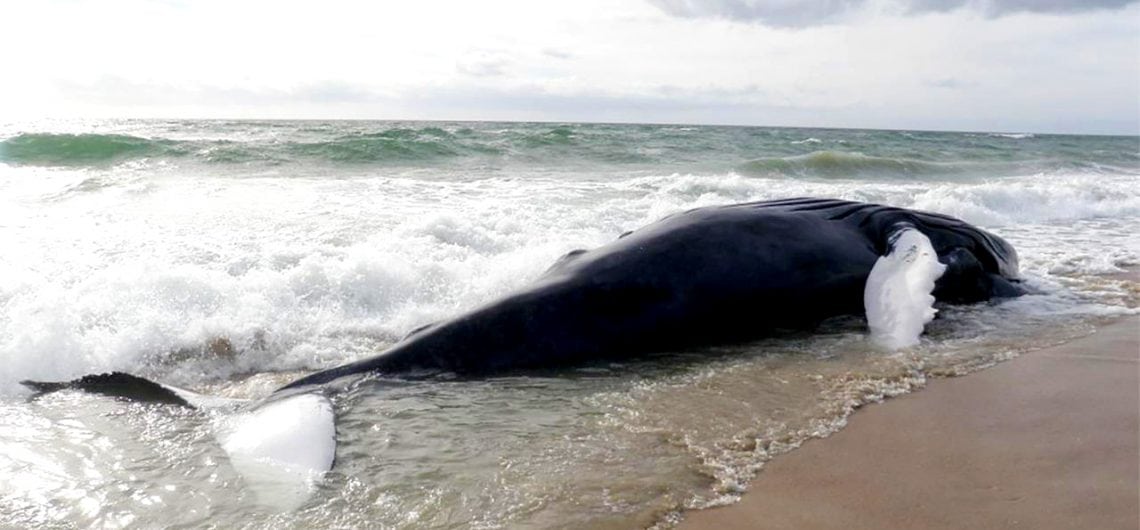12 POSSIBLE REASONS WHY WHALES BEACH THEMSELVES
As Whale Watching continues to grow as a tourism experience, the impact humans have and are having on whales is becoming both more apparent and yet at the same time in many areas less clear. Beached whales are an event that deeply touches everyone that hears about it, sees it, or is involved with. And as technology continues to “shrink” our world such events are becoming more and more known by more people. It is believed that whales have been beaching themselves since at least 300 B.C. but scientists are unsure if the increase is because more people are reporting it or if there is an actual increase in beaching’s. One thing is clear. A beached whale (or worse whales) create(s) a massive response from the public, and despite the obvious difficult situation will usually see enormous numbers of people doing everything possible to assist. Although there is still no clear cut explanation for why these beachings occur, the following 12 impacts are strongly believed to likely be at least partially the cause.
1) Injuries from collisions with boats, ships and other man-made obstructions.
As recently seen on the Gold Coast, Shark nets have an impact as do the many ships on the ocean with increased global trade, the opportunities for whales to collide with ships and become injured or disoriented causing them to accidentally strand themselves.
2) Water pollution
As our waterways are becoming more polluted, whales and other sea animals are suffering. They can become sick or poisoned from chemicals such as gas, plastics and rope in the sea as well as the daily waste products from everyday living.
3) Confusion due to man-made sonar
Some biologists and scientists think that whales may become disoriented, sick and confused by the use of man-made sonar which may interfere with a whales brainwaves causing the whale to lose its sense of direction and beach itself.
4) Natural diseases
Like any living creature, whales are susceptible to sickness or disease that may come about for an unknown reason or due to age.
5) Attacks from sharks or other marine mammals
Whales may beach themselves in an attempt to escape or find cover from shark attacks or attacks from other marine mammals such as the killer whale.
6) Poison from various aquatic species
While it is more difficult to find adequate information regarding whales being poisoned by other aquatic species it is definitely possible that a whale could become poisoned and disoriented causing it to swim to shore.
7) Changes or abnormalities in the earths magnetic field
Some biologists believe that abnormalities caused by changes in the earths magnetic field may interfere with a whales biological navigation causing it to lose its sense of direction
8) Pneumonia
Just as humans get Pneumonia so do whales and there are recorded cases of whales swimming to shore as a result of catching Pneumonia.
9) Traumas caused by various aquatic elements in the environment
While whales generally have a good sense of direction and are excellent swimmers there are some instances when a whale may collide with a large natural element (ie: a large rock) in its environment causing it to become injured and disoriented.
10) Changes in the weather and ocean caused by global warming
A common topic discussed today is global warming and its impact on the earth.
Changes in the tides, melting icebergs and shifting food sources such as fish may force whales to relocate and wander off course causing them to swim into shallow waters or possibly even beach themselves.
11) The whale has already died
The whale had died before beaching: Sometimes the whale is already dead when it becomes beached on the sea. It may have died naturally or from another cause. In some cases a whale may end up beached because it has already died and ended up washing ashore.
12) Following the pack
They are trying to help another whale: There is a theory that some whales beach themselves trying to find a whale who is crying out in distress because they have been beached. They try to follow their calls and end up in shallow waters or on the sand themselves Whales are very social creatures often travel in large pods or groups. In rare instances some pods or groups may unknowingly follow a sick or disoriented whale towards shallow waters and/or beaches where they can possibly get stuck in shallow water or end up beaching themselves. As stated earlier some of these theories are difficult to prove on a large-scale, however they are worth noting because each concept posses a possibility as to why whales beach themselves and is important for finding possible solutions to this problem, especially those that may be caused by the contribution of humans.
- Noise pollution– As more and more artificial sounds enter the oceans atmosphere growing concerns are developing regarding the likelihood of man-made sounds affecting the hearing of various marine mammal species. These sounds may include sonar, loud jet engines and explosives among other noises.
- Water pollution– Chemical pollution from oil and other toxic chemicals can have a dramatic affect on whale populations and affect their food supply. Poisoned fish could lead to sickness and death among the whales that consume these foods.
- Collisions with boats – The increasing use of commercial/personal boats can lead to congested areas of water that may increase the chances of a whale being struck by a passing boat.
- Overfishing– Areas that are being over fished could lead to shortages in food supplies which could forces the marine mammals to relocate or deal with having difficulties finding food.



